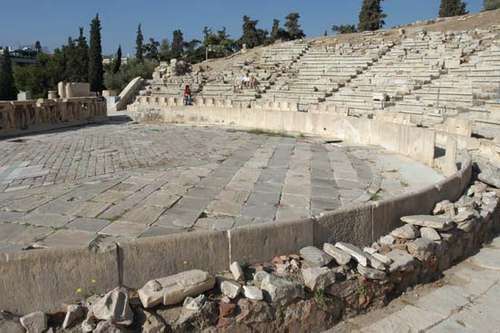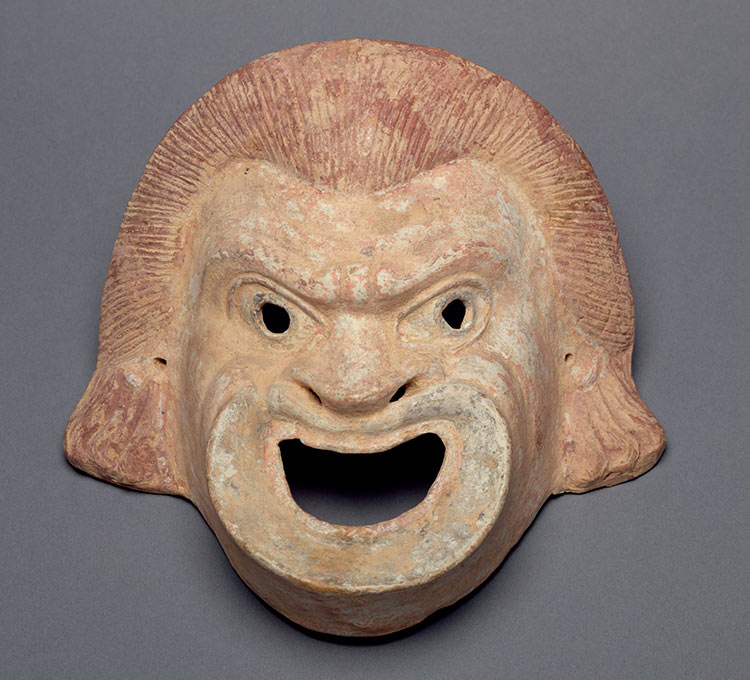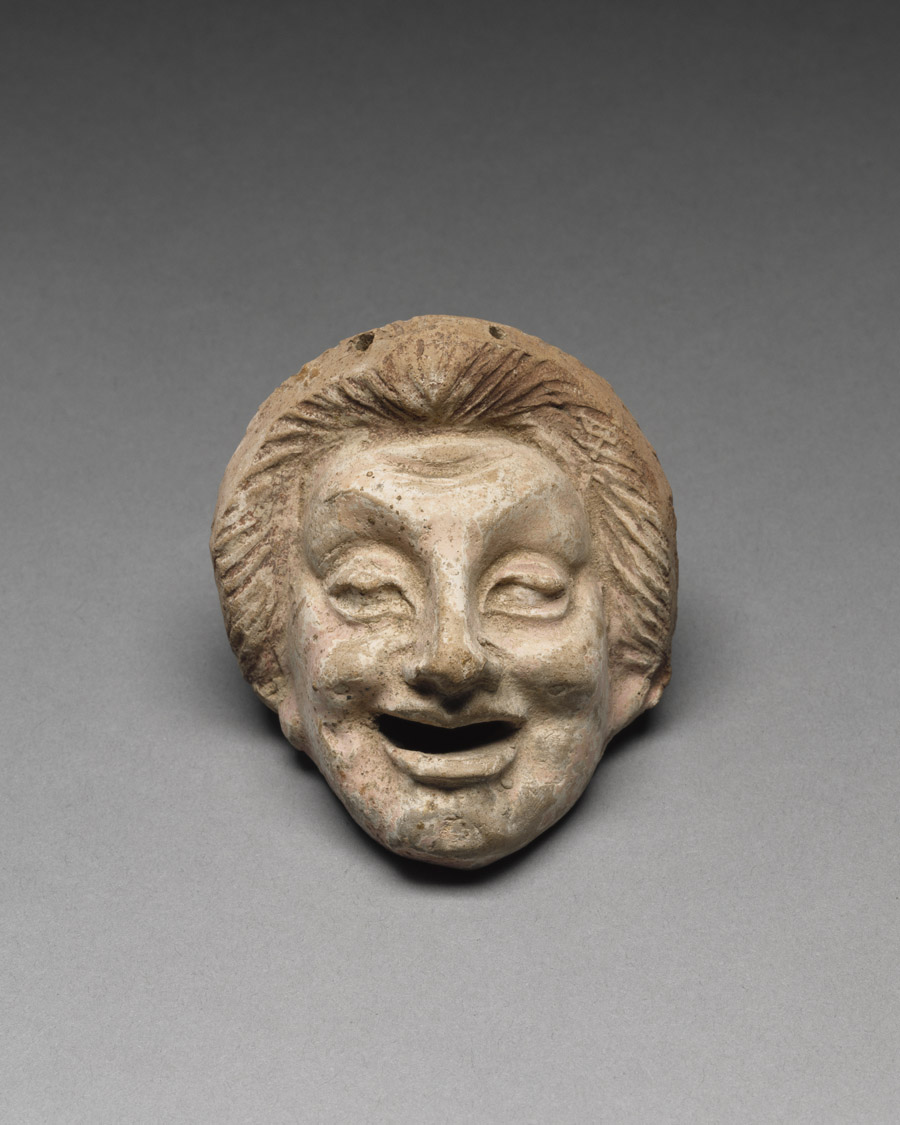CLAS 301B
January 21, 2025
Plautus & Early Roman Comic Theater (Casina)
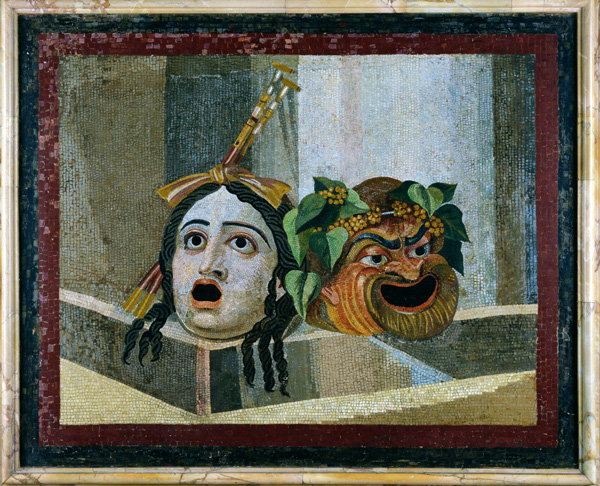
Mosaic of theater masks (Rome, Aventine Hill, 2nd century CE)
Ancient Greek Comic Background
Plautus (ca. 254-184 BCE)
- Titus Maccius Plautus = “Phallus (?), son of Clown, the Flatfoot/Mime Actor” > influence of native Italian, non-literary theater (mime, farce; improvisatory, bawdy & slapstick comedy – faux-wedding plot in Casina?)
- Latin plays based on Greek New Comedy models distorted by Plautus: music, more farcical, broader characterization, linguistic fireworks = puns, jokes, parody (cf. parallel texts of Menander's Double Deceiver & Plautus' Two Bacchises, 1968 papyrus discovery)
- character types of Greek New Comedy taken over (nuclear family, slaves, soldiers, pimps, prostitutes, cooks, etc.); typical plots about possession of women – love interest of young man, obstacles (pimp, father); role of clever slave amplified in Plautus (Casina?)
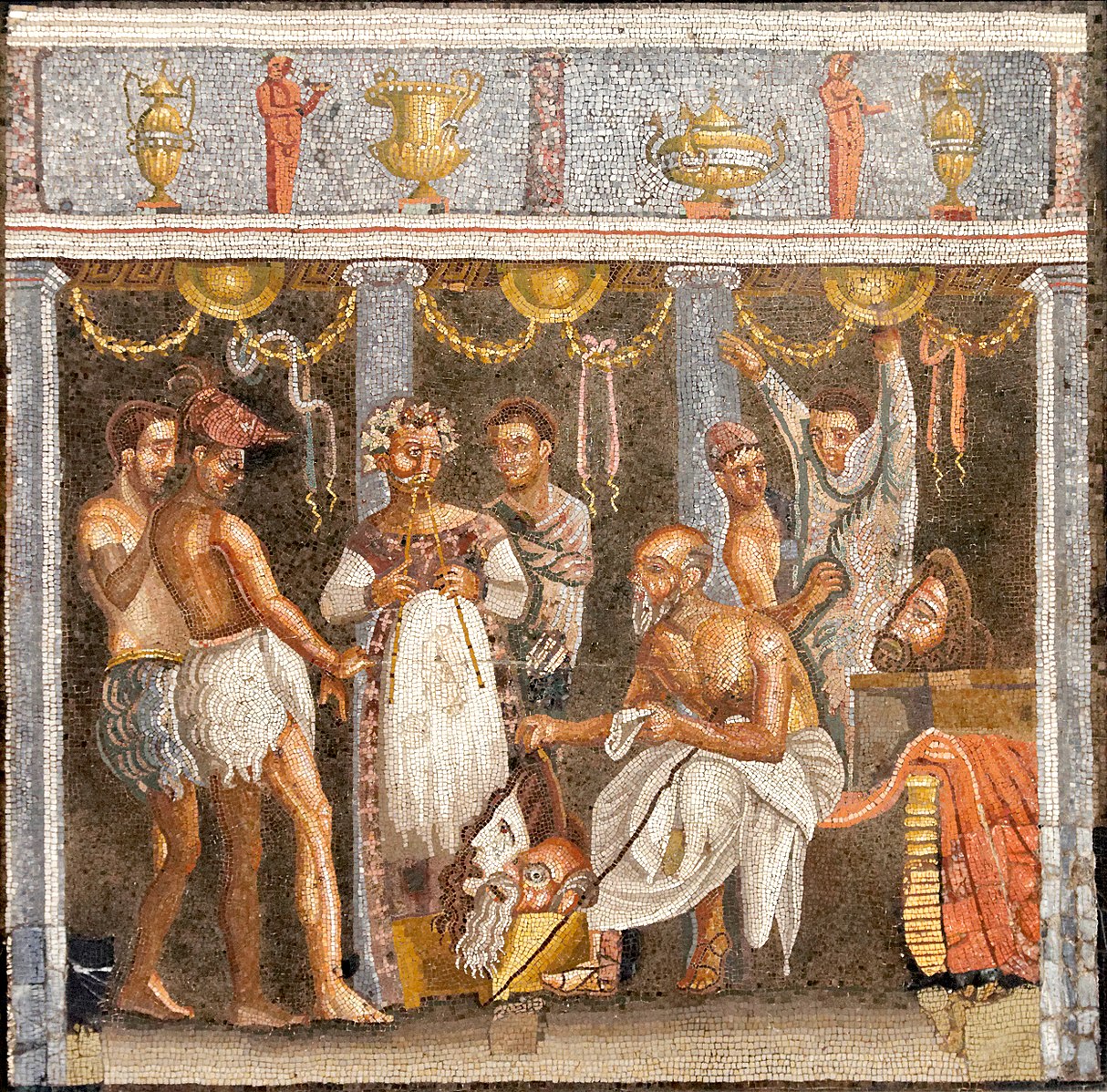
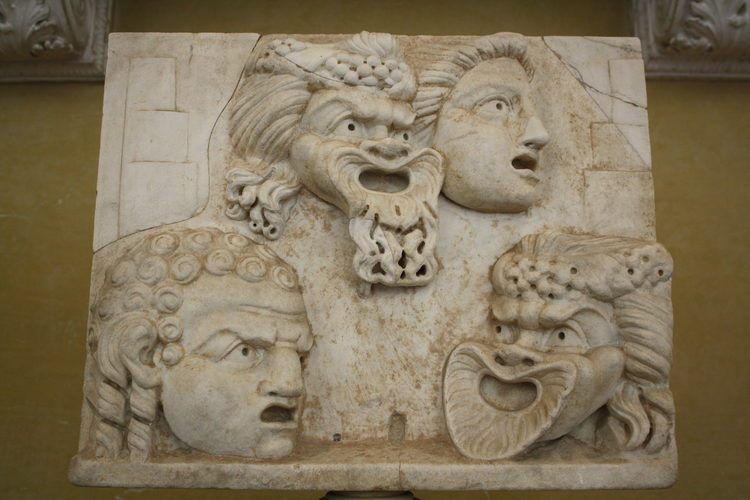
L: Mosaic of Greek theater scene (Pompeii); R: relief of Greek masks (2nd century BCE)
- characters wear masks, costumes codified (gender, class, age, etc.)
- Greek setting ("Athens") but Roman customs, persons, places, institutions, etc. ("Romanization", e.g. Myrrhina's use of Roman divorce formula, "Out of the house, woman!", 210/12); hybrid "Plautinopolis"
- no chorus but cantica (“songs”) + spoken lines (ca. 1/3 of Plautus) + musically accompanied lines (tibia = double-reed); continuous action (no acts, choral interludes as Greek New Comedy)
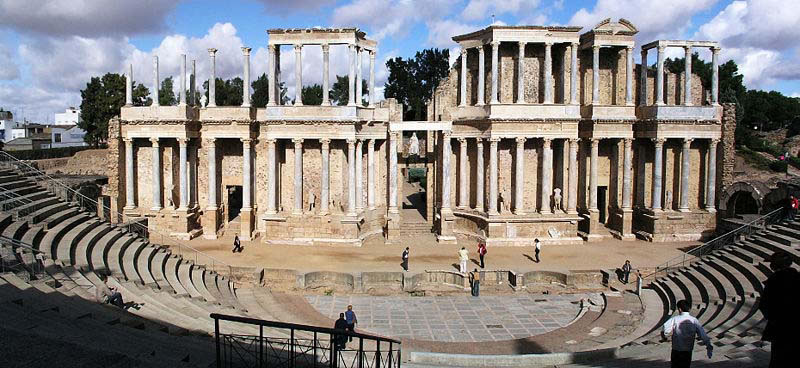
Roman theater in Mérida (Spain, 16-15 BCE)
Roman Theater in Plautus’ Day
- temporary structures (forum, circus, temple); raised platform-stage a city street, painted backdrop (scaena) with 2-3 houses; 2 side-wings (forum vs. harbor/country)

Model of early Roman theater backdrop
- state-sponsored performances at religious festivals (aediles & senate); theater a "gift" to people
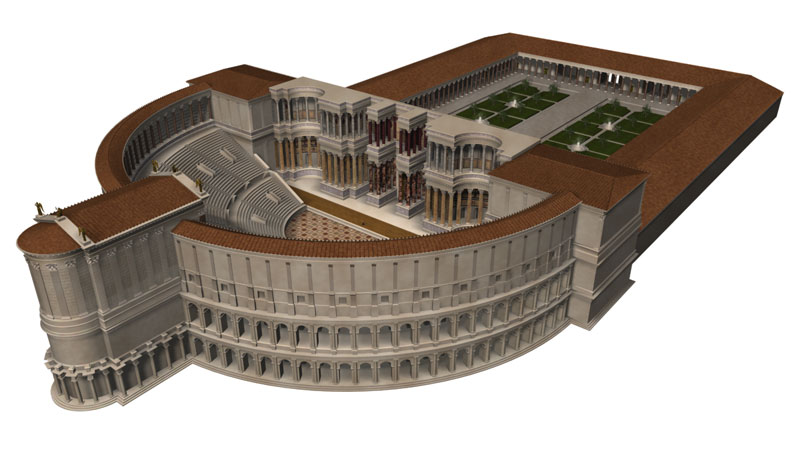
Model of Pompey's theater in Rome (55 BCE)
- temporary seating for audience; no orchestra; hierarchical seating (senators in front)
- acting: low-status profession (cf. prostitution) in Rome; actors mostly slaves
Plautus' Casina
- late play (ca. 185 BCE – "Bacchants", 979ff.): social-historical backdrop – law limited women's personal expenditures (2nd Punic War), repealed after women's protests (195 BCE); woman's finances/property rights still at issue
- Myrrhina & Cleostrata (Scene 3 duet): traditional marriage cum manu (transfer of father’s power & property to husband) vs. marriage sine manu, "without [transfer of] power" (transition in early 2nd century BCE Rome)

Robert De Niro in Dirty Grandpa (2016)
- cast of characters:
Lysidamus, paterfamilias ("Jupiter's" control of household & himself?) & senex amator
Cleostrata (comic hero?)
Myrrhina
slaves Olympio, Chalinus
Pardalisca ("messenger's speech", Scene 14?)
[+ neighbor Alcesimus, cook Citrio]

- absent characters:
Casina ("Cinnamon Girl")
Euthynicus, son of Cleostrata & Lysidamus, sent abroad – "[Plautus] brought down a bridge on the young man’s way home" (66) > plot shift?
- Greek source play's title from lot-drawing Scene 7
Casina 31-34 (prologue)
In Greek this comedy’s called Klerumenoi, ["The Lot-Drawers"]
In Latin Sortientes. Diphilus is the
Greek author. Plautus—he of the barking name—
Got hold of it and reworked it all over again.
- other Plautine changes to Greek source play?
PROLOGUE: removed recognition plot (Casina's status) from play – exposed child & old slave, "laid up sick now" (37); "His mistress agreed and gave it all her care, / Just as if it were her very own daughter (45-46)
EPILOGUE:
Spectators, here’s what will happen inside:
It’ll be discovered that this Casina is the neighbor’s daughter
And she’ll marry our young master, Euthynicus.
- violent homoerotic honeymoon (Scenes 21-23) – Plautine addition replacing traditional wedding?
- Romanized performance context
Casina 79-86 (end of prologue)
Now back to that abandoned girl,
The one the slaves are so eager to marry:
Turns out she’s a freeborn virgin:
Yes, the daughter of an Athenian! So they’ll be no
Fooling around with her in this comedy.
But trust me, as soon as the play’s over,
I’m sure whoever counts out the cash to her
Can have his honeymoon—no ceremony necessary!
- Cleostrata's metatheatrical victory over Lysidamus – elements of play-within-the-play?
Casina 855-861 (women wait for Lysidamus and Olympio to exit house)
Myrrhina
Such fine and fitting entertainment inside!
We’re out here on the street now to watch the wedding festival.
My goodness, I’ve never laughed so much in my life
And doubt I’ll ever laugh like that again!
Pardalisca
I so want to know what the new He-bride is doing with his new husband!
Myrrhina
No playwright has ever devised a better
Plot than this clever production of ours!
Casina 1005-1006 (Cleostrata's metatheatrical decision to forgive Lysidamus)
But the only reason I'm going to forgive him
Is that this play is long and I don't want to make it any longer.
- finale & closure: Lysidamus' cloak & walking stick returned, all enter (his) house; family order/power dynamic restored?; a "proto-feminist" play?
Casina 1015-1018 (epilogue)
Now the right thing for you to do is to give us the thundering applause
We so richly deserve. Those who do will win the whore of their dreams
(and the wife will be none the wiser). Those who don't applaud as loudly as possible,
Will take a he-goat bathed in sewer-water to bed instead!


